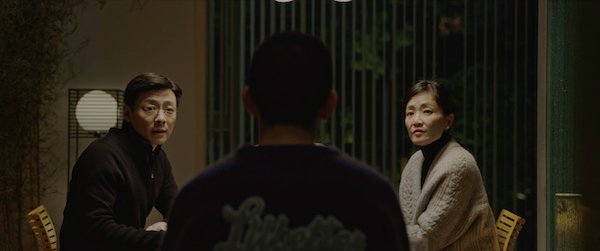
Classmates, one rich, one poor, are thrown together by accident. The poor one worms his way into the wealthy family, winning over the parents through deceit and subterfuge. An event changes the lives of all involved.
No, it’s not Saltburn, although Jia ting jian shi / A Brief History of a Family follows a surprisingly similar trajectory to Emerald Fennell’s 2023 film. Writer and director Lin Jianjie is even aiming for the same targets, although his story takes place in an urban Chinese setting. Brief History screened in the Panorama section of this year’s Berlinale.
When Shuo (Sun Xilun) suffers a playground accident, his classmate Wei (Lin Muran) helps him to the infirmary. Over the following days, Shuo, shy and deferential, gradually reveals an abusive home life. Wei invites him home.
Wei lives in an expensive high rise. His father (Zu Feng) is a microbiologist; his mother (Guo Keyu), a former flight attendant. They ask Shuo to dinner and later say he is welcome to come back when he wants.
Shuo does return, frequently, whether or not Wei is there. Shuo realizes that Wei is a disappointment to his parents. An indifferent student, he doesn’t study, doesn’t practice athletics, and seems content to play computer games all the time.
On the other hand, Shuo is an exemplary student, knows more about Wei’s sports than he does, and pays attention to Wei’s parents. He remembers what foods his mother likes, what records his father plays. When they go on a business trip, they invite Shuo along. Wei has to stay home to study for a test.
Lin, who also goes by the nickname JJ, is an advocate of the slow burn. Scenes unfold slowly, the camera a hesitant observer, often looking through doorways or over shoulders. The production design is icy cold in Wei’s apartment, neutral elsewhere.
The music leans Western, a conscious choice on the director’s part. In fact, Brief History of a Family looks and feels more like a European film than a Chinese one. The big difference is one of scale. Films like Saltburn show extravagant inequalities. Here not that much separates the haves and have-nots.
Lin studied bioinformatics in college before attending film school at NYU. This is his feature debut. Occasionally he will insert montages of microscopic organisms, suggesting that humans operate under similar biological impulses. There’s a detached, clinical feel to Brief History, almost a sense that Lin is experimenting with his characters.

The most interesting person in the movie is Wei’s mother, played with delicate precision by Guo Keyu. Speaking in whispery cadences, using soft gestures, she can’t completely hide her insecurity about her past as a glorified servant. Still, she hidden strengths. She blames her husband for his behavior during China’s one-child policy, and holds her trauma over him like a club.
Lou Yin, one of the producers, told me that Guo Keyu was China’s youngest best actress. “She won for Red Cherry when she was sixteen. That film appeared in the Berlin Panorama program in 1996. She’s returning here after 28 years.”
The psychology of the other characters isn’t nearly as interesting. Shuo is only trying to get ahead, using whatever means are available to him. Wei is alternately sluggish and resentful. His father is a workaholic. Since they are drawn so simply, their outcomes are evident early on.
At least Brief History avoids the histrionics that made Saltburn so annoying. But judging one film not as bad as another is faint praise indeed.
Credits: Written and directed by Lin Jianjie. Produced by Lou Ying, Zheng Yue, Wang Yiwen. Director of Photography: Zhang Jiahao. Production Designer: Xu Yao. Editor: Per K. Kirkegaard. Composer: Toke Brorson Odin. Cast: Zu Feng, Guo Keyo, Sun Xilun, Lin Muran.
Photos © First Light Films, Films du Milieu, Tambo films


